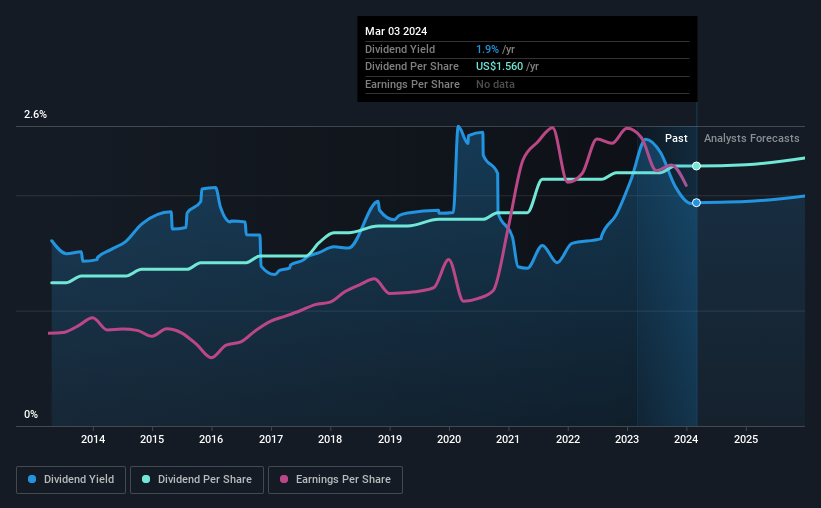UMB Financial Corporation (NASDAQ:UMBF) Looks Like A Good Stock, And It's Going Ex-Dividend Soon
Some investors rely on dividends for growing their wealth, and if you're one of those dividend sleuths, you might be intrigued to know that UMB Financial Corporation (NASDAQ:UMBF) is about to go ex-dividend in just 4 days. Typically, the ex-dividend date is one business day before the record date which is the date on which a company determines the shareholders eligible to receive a dividend. The ex-dividend date is important as the process of settlement involves two full business days. So if you miss that date, you would not show up on the company's books on the record date. Therefore, if you purchase UMB Financial's shares on or after the 8th of March, you won't be eligible to receive the dividend, when it is paid on the 1st of April.
The company's upcoming dividend is US$0.39 a share, following on from the last 12 months, when the company distributed a total of US$1.56 per share to shareholders. Last year's total dividend payments show that UMB Financial has a trailing yield of 1.9% on the current share price of US$80.60. Dividends are a major contributor to investment returns for long term holders, but only if the dividend continues to be paid. We need to see whether the dividend is covered by earnings and if it's growing.
Check out our latest analysis for UMB Financial
Dividends are usually paid out of company profits, so if a company pays out more than it earned then its dividend is usually at greater risk of being cut. UMB Financial paid out just 21% of its profit last year, which we think is conservatively low and leaves plenty of margin for unexpected circumstances.
Companies that pay out less in dividends than they earn in profits generally have more sustainable dividends. The lower the payout ratio, the more wiggle room the business has before it could be forced to cut the dividend.
Click here to see the company's payout ratio, plus analyst estimates of its future dividends.
Have Earnings And Dividends Been Growing?
Businesses with strong growth prospects usually make the best dividend payers, because it's easier to grow dividends when earnings per share are improving. If business enters a downturn and the dividend is cut, the company could see its value fall precipitously. Fortunately for readers, UMB Financial's earnings per share have been growing at 13% a year for the past five years.
The main way most investors will assess a company's dividend prospects is by checking the historical rate of dividend growth. Since the start of our data, 10 years ago, UMB Financial has lifted its dividend by approximately 6.1% a year on average. We're glad to see dividends rising alongside earnings over a number of years, which may be a sign the company intends to share the growth with shareholders.
To Sum It Up
Should investors buy UMB Financial for the upcoming dividend? Companies like UMB Financial that are growing rapidly and paying out a low fraction of earnings, are usually reinvesting heavily in their business. Perhaps even more importantly - this can sometimes signal management is focused on the long term future of the business. UMB Financial ticks a lot of boxes for us from a dividend perspective, and we think these characteristics should mark the company as deserving of further attention.
So while UMB Financial looks good from a dividend perspective, it's always worthwhile being up to date with the risks involved in this stock. Every company has risks, and we've spotted 1 warning sign for UMB Financial you should know about.
If you're in the market for strong dividend payers, we recommend checking our selection of top dividend stocks.
Have feedback on this article? Concerned about the content? Get in touch with us directly. Alternatively, email editorial-team (at) simplywallst.com.
This article by Simply Wall St is general in nature. We provide commentary based on historical data and analyst forecasts only using an unbiased methodology and our articles are not intended to be financial advice. It does not constitute a recommendation to buy or sell any stock, and does not take account of your objectives, or your financial situation. We aim to bring you long-term focused analysis driven by fundamental data. Note that our analysis may not factor in the latest price-sensitive company announcements or qualitative material. Simply Wall St has no position in any stocks mentioned.

